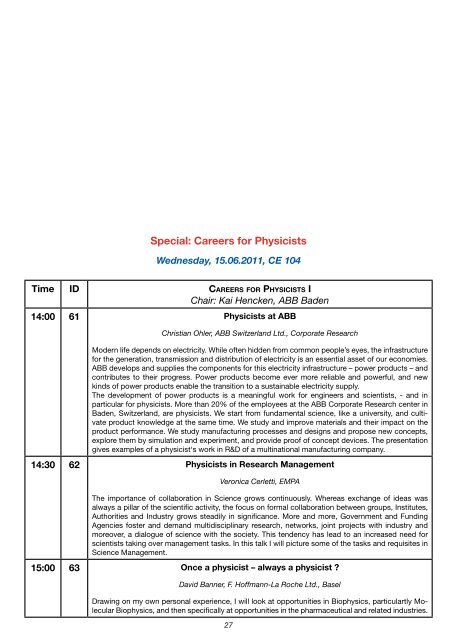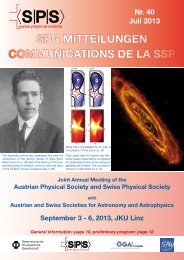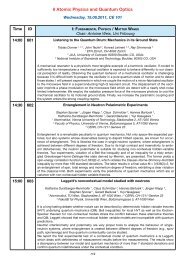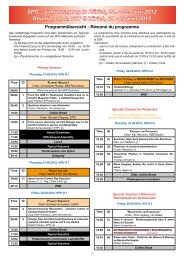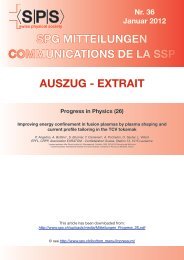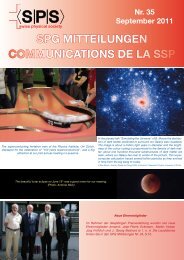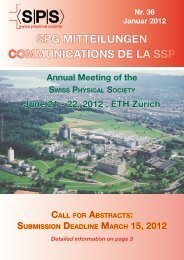Special: Careers for Physicists
Special: Careers for Physicists
Special: Careers for Physicists
You also want an ePaper? Increase the reach of your titles
YUMPU automatically turns print PDFs into web optimized ePapers that Google loves.
<strong>Special</strong>: <strong>Careers</strong> <strong>for</strong> <strong>Physicists</strong><br />
Wednesday, 15.06.2011, CE 104<br />
Time ID <strong>Careers</strong> <strong>for</strong> PhysiCists i<br />
Chair: Kai Hencken, ABB Baden<br />
14:00 61 <strong>Physicists</strong> at ABB<br />
Christian Ohler, ABB Switzerland Ltd., Corporate Research<br />
Modern life depends on electricity. While often hidden from common people’s eyes, the infrastructure<br />
<strong>for</strong> the generation, transmission and distribution of electricity is an essential asset of our economies.<br />
ABB develops and supplies the components <strong>for</strong> this electricity infrastructure – power products – and<br />
contributes to their progress. Power products become ever more reliable and powerful, and new<br />
kinds of power products enable the transition to a sustainable electricity supply.<br />
The development of power products is a meaningful work <strong>for</strong> engineers and scientists, - and in<br />
particular <strong>for</strong> physicists. More than 20% of the employees at the ABB Corporate Research center in<br />
Baden, Switzerland, are physicists. We start from fundamental science, like a university, and cultivate<br />
product knowledge at the same time. We study and improve materials and their impact on the<br />
product per<strong>for</strong>mance. We study manufacturing processes and designs and propose new concepts,<br />
explore them by simulation and experiment, and provide proof of concept devices. The presentation<br />
gives examples of a physicist‘s work in R&D of a multinational manufacturing company.<br />
14:30 62 <strong>Physicists</strong> in Research Management<br />
Veronica Cerletti, EMPA<br />
The importance of collaboration in Science grows continuously. Whereas exchange of ideas was<br />
always a pillar of the scientific activity, the focus on <strong>for</strong>mal collaboration between groups, Institutes,<br />
Authorities and Industry grows steadily in significance. More and more, Government and Funding<br />
Agencies foster and demand multidisciplinary research, networks, joint projects with industry and<br />
moreover, a dialogue of science with the society. This tendency has lead to an increased need <strong>for</strong><br />
scientists taking over management tasks. In this talk I will picture some of the tasks and requisites in<br />
Science Management.<br />
15:00 63 Once a physicist – always a physicist ?<br />
David Banner, F. Hoffmann-La Roche Ltd., Basel<br />
Drawing on my own personal experience, I will look at opportunities in Biophysics, particulartly Molecular<br />
Biophysics, and then specifically at opportunities in the pharmaceutical and related industries.<br />
27
I am of the firm belief that a rigorous scientific training is an excellent preparation to branch out into<br />
other fields. I hope to be able to give a few tips and provide a seried of examples to encourage you<br />
consider advancing into previously unknown territory.<br />
15:30 64 Industrial Research and gender aspects – future <strong>for</strong> physicists in Europe ?<br />
Doris Steinmüller-Nethl, Rhobest<br />
16:00<br />
Industry has a leading role in research, innovation and development. European companies need experts<br />
and scientists to boost their innovation and competitiveness. <strong>Physicists</strong> can fulfill these requirements.<br />
Industrial research opens the possibility to develop innovative technologies and products <strong>for</strong><br />
the benefit of humankind. Interdisciplinarity and diversity are key factors <strong>for</strong> success.In this presentation<br />
the female physicist Doris Steinmüller-Nethl, will report about the challenges of her profession,<br />
hurdles she was confronted with and her passion <strong>for</strong> technology. This short glimpse into promising<br />
career options in industrial research should give an impetus <strong>for</strong> young physicists to trust and develop<br />
their talents and realize their opportunities.<br />
Coffee Break<br />
<strong>Careers</strong> <strong>for</strong> PhysiCists ii<br />
Chair: Kai Hencken, ABB Baden<br />
16:30 65 Why physicists are well prepared <strong>for</strong> the business world of tomorrow<br />
Adrian Honegger, Basler Versicherung<br />
<strong>Physicists</strong> usually unify wonder, creativity, inquiry and perseverance with superior capacities in conceptual<br />
reasoning and exact sciences. While some prefer experiments, others favour theories and<br />
mathematical models. The tribe of the physicists can be characterized by a passionate curiosity to<br />
understand the fundamental nature of things. Although impressive and valuable, the a<strong>for</strong>ementioned<br />
abilities don’t guarantee success in the corporate world with rapidly accelerating market dynamics<br />
and ever increasing complexity. Sine qua non <strong>for</strong> sustainable business success is mastery in the<br />
trade of getting people to collectively try new things despite paralyzing uncertainties, i.e. personnel<br />
cutbacks or organizational changes. In other words, you need the capacity to understand complex<br />
systems and to establish and adapt organizational structures and processes such that every employee<br />
within the organization feels a purpose, autonomy and mastery in what he does. This will lead<br />
to self-direction, higher engagement and ultimately to better per<strong>for</strong>mance, sustainably. In Einstein’s<br />
words: “Anyone who has never made a mistake has never tried anything new.” A good manager gets<br />
his employees to make decisions and mistakes, to learn and to have fun. Things physicists are quite<br />
good at, too, aren’t they?<br />
17:00 66 A physicist in the cell - Or what a physicist can learn from biological systems.<br />
Angelino Paolo, Laboratory of Computational System Biotechnology, EPFL<br />
In the past few decades, research in biology has shifted from a descriptive to a quantitative science.<br />
New advanced experimental techniques are at the basis of this revolution. These techniques allow<br />
researchers to identify and quantify molecular components inside cells, thus unraveling the fine<br />
clockwork of living organisms. In the last decade, a new revolution took place, where research in the<br />
biological sciences moved from reductionist to systemic approaches. Using a clockwork analogy, a<br />
reductionist approach consists to study the shape and size of single wheels in a watch, while a systemic<br />
approach tells us how gears work together so accurately to give the precise time of the day. Accordingly,<br />
Systems Biology, as this systemic approach is called, focuses on a global study of complex<br />
networks of chemical reactions and signals within living systems, where a key role is played by the<br />
interactions among the system components. This approach has proven to be useful in understanding<br />
where the cellular fine clockwork fails and diseases develop, in the identification of new drugs, and in<br />
the ‘design’ of microorganisms <strong>for</strong> the production of chemicals and biofuels. A field, the one of System<br />
Biology, which apparently looks far away from my personal background as a physicist in plasma<br />
theory. How the background of a physicist turns to be useful in the study of biological systems? What<br />
a physicist learns and which skills he needs to develop to cope with the problems met in this field? In<br />
this presentation, I will address these questions and give a glimpse of the life of a physicist in the cell.<br />
17:30 END<br />
18:30 Postersession and Apéro<br />
28


